Adding social proof can pay dividends in boosting your conversion rates.
For this reason, it’s become commonplace for many big brands like Amazon and WordPress to use social proof on their websites, along with just about every major online business today.
When it comes to running an online course, social proofs can provide a psychological edge for your business ahead of competing courses and lead to significant boosts in the volumes of users who choose to buy into your services.
But what is social proof?
And how does it help optimize and improve conversion rates?
Let’s take a deeper look into one of the most effective marketing strategies in the digital marketing landscape:
What is Social Proof?
By definition, social proof is “a psychological phenomenon where people conform to the actions of others under the assumption that those actions are reflective of the correct behavior.”
Marketers use social proof as a method of boosting conversion rates for products and services by looking to allay the fears of customers who are looking for peace of mind before engaging in making a purchase.
Social proofs have become one of the most powerful eCommerce entities in terms of buying products or paying for services and software.
According to studies, 92% of online consumers read at least one product review before purchasing. Interestingly, product reviews are around 12 times more trusted online than product descriptions or manufacturer sales copy.
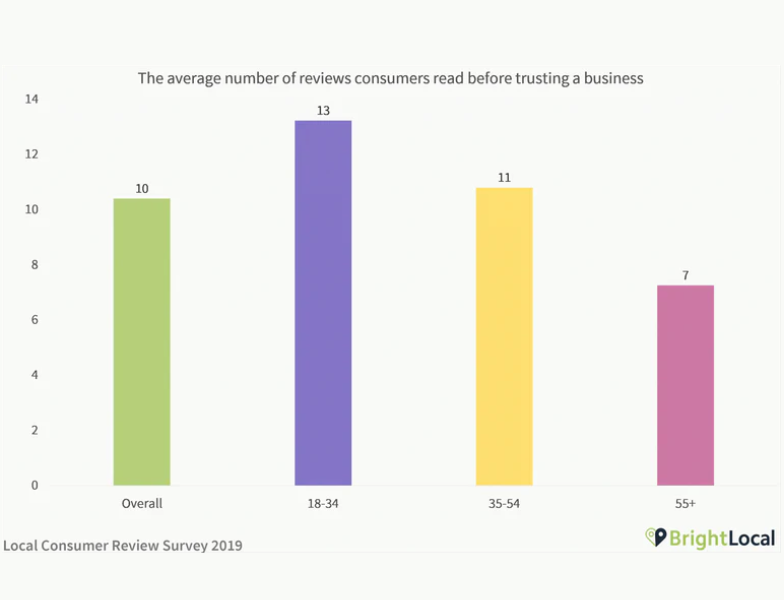
(Image: BrightLocal)
In the chart above, we can see that, on average, the majority of consumer age groups read over 10 reviews of a business before trusting them. This indicates that consumers are eager to gain proof from their peers and unbiased websites before opting to make a purchase.
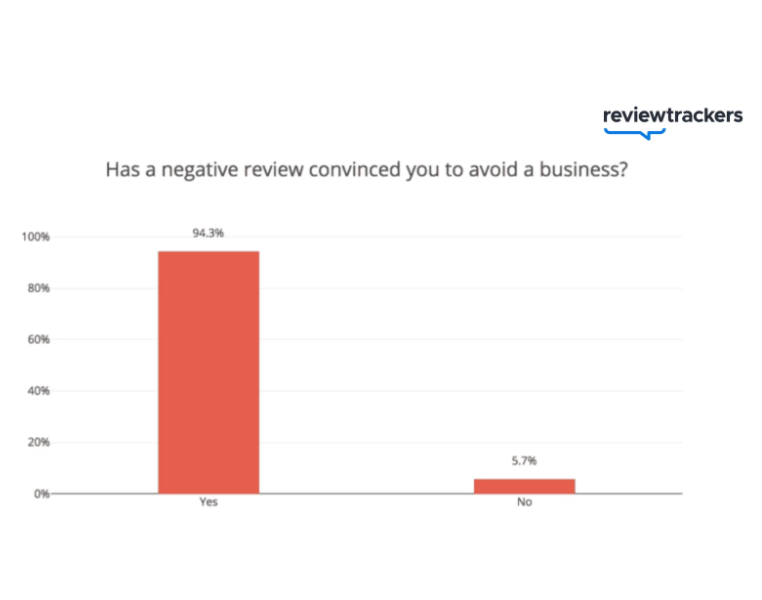
(Image: Reviewtrackers)
As we can see from the chart above, the vast majority of shoppers are likely to abandon their purchasing process if they see a negative review that they trust.
This shows that humans have transferred their sociable mindsets into online spaces, where the experiences of others can play a significant role in their expectations surrounding purchasing decisions.
Now, let’s take a look at how social proof works in practice:
Principles of Persuasion
Several psychological principles play a significant role in informing purchase decisions. Psychological triggers and cues can play a vital role in snapping potential customers out of their passive browsing and into the right frame of mind to buy a product, or in this case, enroll in an online course.
One of the most heavily adopted frameworks for adopting psychology within this form of marketing can be found in Robert Cialdini’s seven principles of persuasion, listed in his 1984 book, Influence - The Psychology of Persuasion. These seven key principles have been dubbed ‘principles that make people say yes.’
The first principle revolves around reciprocity; this helps to instill a sense of gratitude among your customers. Another critical principle is scarcity. By adding scarcity, customers can become aware of how they may miss out on courses if they don’t enroll at a particular time. Authority is another crucial way of building trust in customers by demonstrating your industry expertise.
One of the most significant aspects of the principles of persuasion comes in the form of commitment and consistency. This leads customers to big purchases through smaller commitments. When it comes to delivering courses, you can practice commitment and consistency by releasing smaller, more bite-sized lessons to help entice would-be students into your funnel. Liking is the principle that makes customers feel good about buying from you. This is particularly important for leveraging more positive reviews after purchases are made.
Social proof is the principle that enables the wisdom of your happy customers to guide interested browsers towards buying your courses too. The final principle is unity, which revolves around making customers feel as though they’re welcome and comfortable after embracing your products. This can be achieved by encouraging a vibrant and committed community and creating a space for them to share their experiences.
Now that we have a solid understanding of the power of psychology in marketing, let’s take a look at how social proofs can help to optimize conversions for your online course business:
Numbers to Shout About
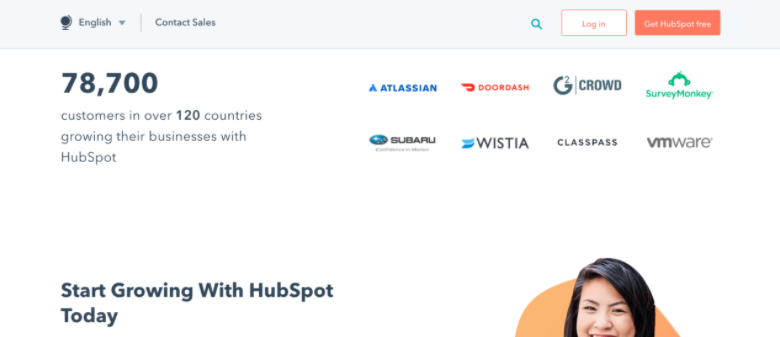
(Image: Canny)
As an online course business, one of the most effective ways to provide social proof of your processes is by sharing your successes through the tactical use of data.
Are you attracting a steady flow of users signing up for your course? Has one course gained over 1,000 subscribers over time? By revealing your website just how many people are buying your services, you can use quantifiable numbers to prove your popularity and encourage more sign-ups, which is essential when running an online course.
The beauty of showcasing your numbers is that you can pick and choose the types of data that you’re most proud of. This means that you can accurately use your numbers to appeal to your customers where it matters most.
For instance, if you don’t have significant numbers of users enrolled in courses but do have many mailing list signups, you can promote how many users are interested in your services.
Alternatively, if you’ve attracted global interest, you can signify how far your presence has spread around the world (as we can see in the example above).
Use Testimonials to Your Advantage
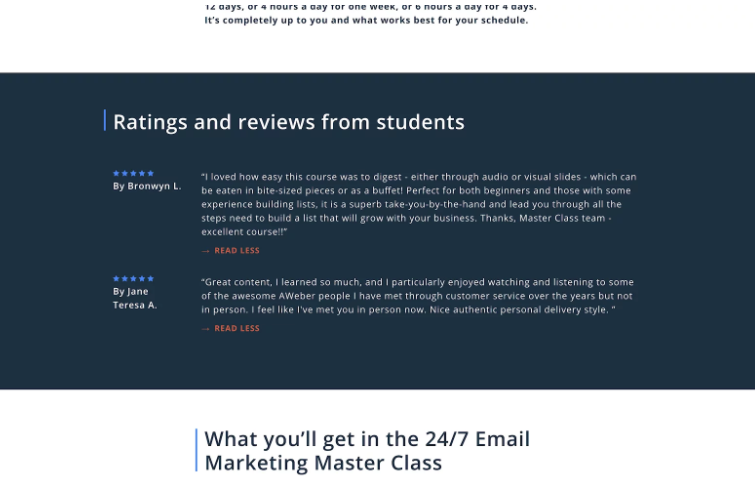
(Image: Thinkific)
Utilizing student testimonials is an excellent way of showing prospective customers just how much their peers enjoyed your course. This is true whether you’re building your own website or you’re looking to tap into one of the many online course platforms available across the internet.
As we’ve already established, user reviews are worth much more than the pledges of a company regarding the products they’re selling. With this in mind, it’s worth inviting users to write a testimonial or record a testimonial video regarding their experience of your course.
This social proof allows businesses to gain free content and attribute it to their customers - a more trustworthy source, according to consumers. When it comes to course creators, this approach is particularly fruitful, as testimonials can go into an appropriate level of depth in describing your course on your behalf. This means that students can use superlatives as they wish, and it wouldn’t come across as disingenuous.
Quantify Interest
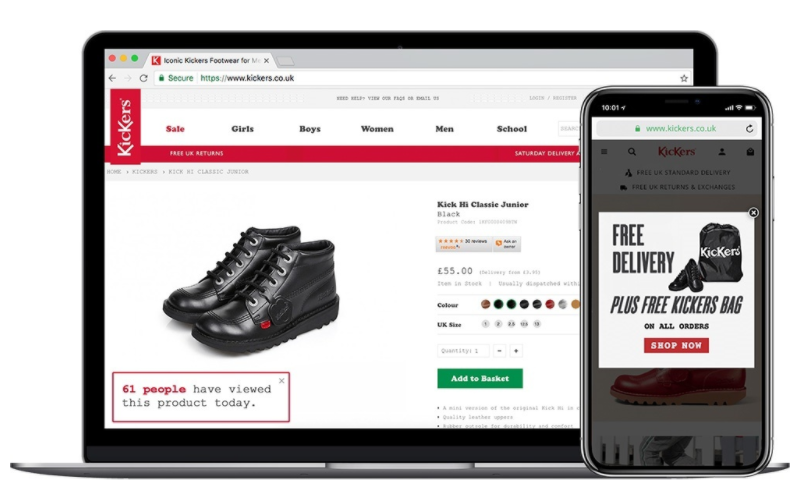
(Image: Yieldify)
Although alerts or push notifications that show buyers how many people are viewing products is social proof designed to cause urgency among shoppers. The grand idea is that if more people consider a product, the more likely said product will sell out.
For example, you can create a sense of urgency differently. Users can potentially be greeted with alerts that suggest 75% of spaces have already been filled for the course’s capacity.
If this doesn’t apply to the service you offer, a simple prompt to say that ‘75 people have viewed this course today’ can affirm the potential buyer’s decision. This influences them to think that the content must be a good fit for them, as there are plenty of other people who are clearly interested.
By quantifying the interest that other users show in your program, you can better optimize your conversion rate by creating a hivemind that suggests the user isn’t alone in thinking your course is excellent. This strength in numbers approach makes more users feel emboldened to enter a sales funnel instead of continuing their passive browsing.
Show Off Your Best Sellers
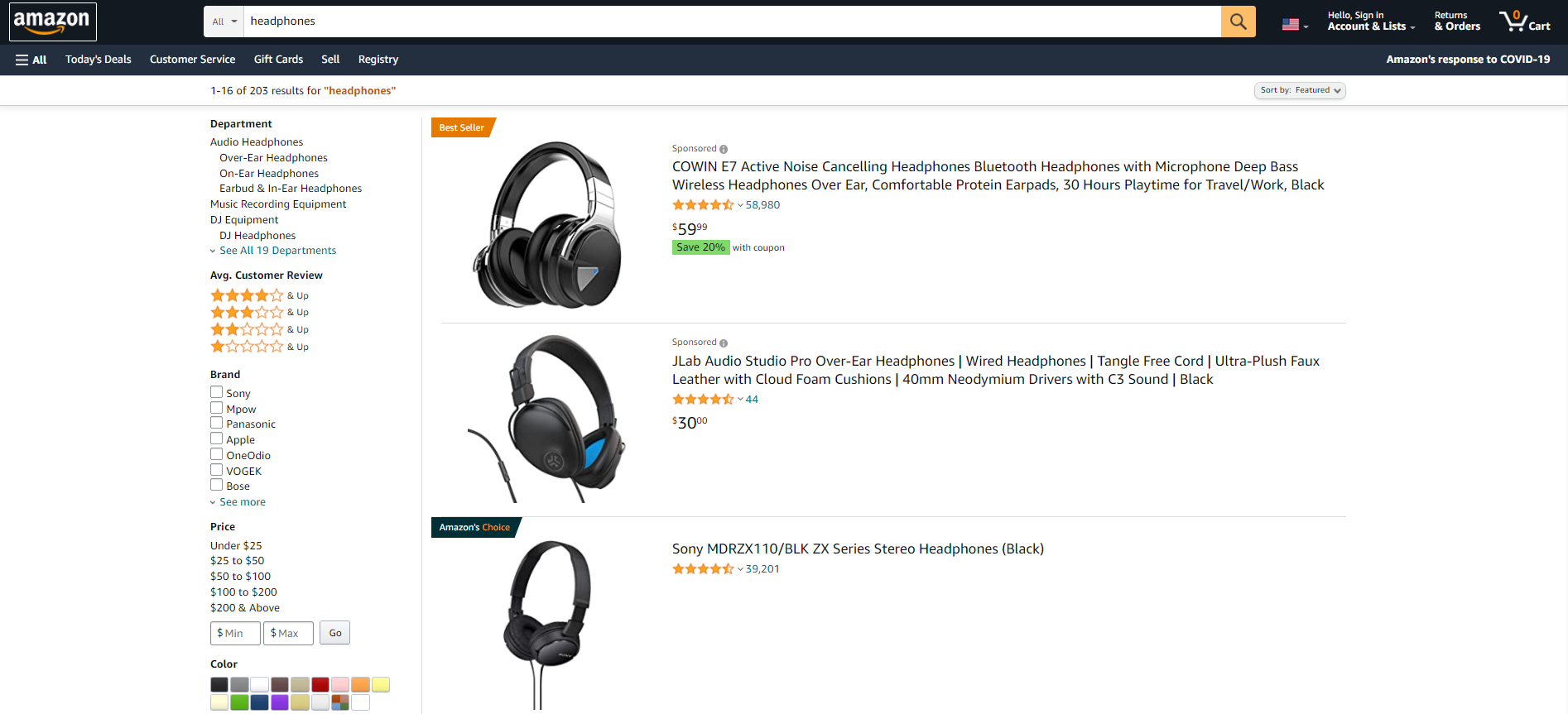
Similar to quantifying interest by displaying metrics on how many buyers or viewers a course has, highlighting best sellers helps users understand where your best services are.
Highlighting your best sellers is a great idea because it offers unsure users a clear avenue in getting started in using your courses. In theory, they’ll choose your best selling course and will be more likely to enjoy it as a result - emboldening them in trying out more. Likewise, you’ll offer them a course that you feel is among your strongest and could set yourself up with more custom in the future.
Psychologically, this is a vital conversion optimization tool because users will gravitate more towards the courses that are demonstrably more popular among students. This will assure them that they’re on to a good thing, and they’ll become more likely to sign up without asking further questions or addressing any doubts they may have.
Create Surveys & Use The Results
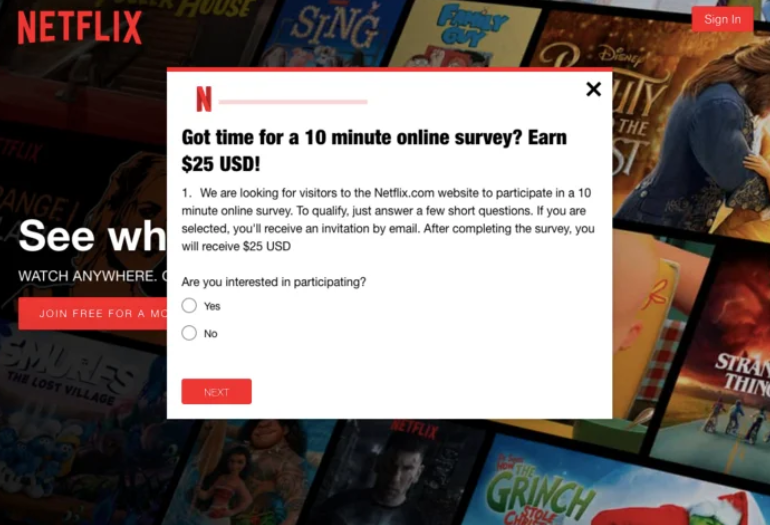
(Image: VWO)
Testimonials can be a great way of showcasing social proof in a textual context. However, encouraging users to take a survey means you can create your own data-driven insights for customers.
Surveys are great marketing tools for many reasons. They help businesses to improve their processes and offer a great deal of personal insight from users. However, once you’ve obtained your information, there’s nothing stopping you from using your more favorable responses to help entice more users to gain confidence in your site.
In the example above, Netflix offers a free incentive for users who are willing to conduct a more detailed survey. While it will do your business no harm to create a free e-book to offer to users in return for completing a survey, you may not need to provide anything to gain enough responses to start using metrics on your site.
For instance, if 80% of respondents said they found your user interface extremely easy to use - this can be a great metric to add to your landing page. If 70% of users felt that they learned some valuable insights through your courses, then that’s great too. If, for instance, 50% of users said they disagreed with your pricing structure, this cannot be used as social proof, but you could still take the feedback on board to create a more efficient pricing structure.
Fundamentally, whether we’re making purchases in brick-and-mortar stores or shopping online, humans are social creatures who enjoy feeling affirmed in their decisions. This is why it’s important to humanize the content we present. It would resonate more deeply and support those decisions through emotional and social connections.
Whether you’re creating an online course on your own blog or website or adding your offerings to the likes of Udemy, Thinkific, or FreshLearn , there are plenty of social proof techniques you can use to gain an advantage in encouraging more users into your sales funnel and towards conversions.
However, to ensure that the trust you build between your business and customers is well-maintained, it’s important to only latch on to real statistics and testimonials. By falsifying peer reviews or data about purchases, there’s a chance that you’ll ultimately undermine your integrity.
In this day and age, the power of the people is just as strong as it’s ever been - and that can be an excellent asset for businesses that know how to use the power of opinion to their advantage.
Find more articles you'll enjoy right here:
Written by DesignCrowd on Friday, January 8, 2021
DesignCrowd is an online marketplace providing logo, website, print and graphic design services by providing access to freelance graphic designers and design studios around the world.
